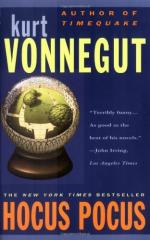|
This section contains 740 words (approx. 3 pages at 300 words per page) |

|
SOURCE: "Life as a Cruel Joke," in Times Literary Supplement, October 26, 1990, p. 1146.
In the following review, Montrose characterizes Hocus Pocus as a novelized essay and praises Vonnegut's masterful style.
Hocus Pocus presents a dystopian America where the future (2001) is like the present, only more so. Everything has worsened: the economy, the ravaging of natural resources, crime, the drugs problem, urban decay, poverty. Petrol and food are rationed. The rich have sold Big Business to foreigners and live off the proceeds. The only surviving "American enterprises" are Mafia-controlled. Nor is public property exempt. National Forests have been sold to a Swedish timber corporation; prisons are run, for profit, by the Japanese (they have, however, declined to take over innercity schools). The novel, like most of Kurt Vonnegut's since Slaughterhouse-Five (1969), takes the form of a grimly comic autobiography replete with vicissitudes, guilt and futility: life as a cruel joke. The...
|
This section contains 740 words (approx. 3 pages at 300 words per page) |

|


